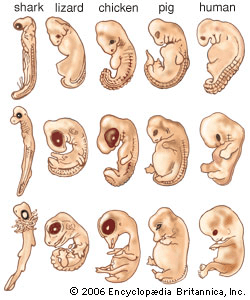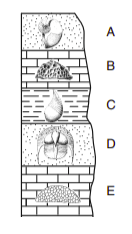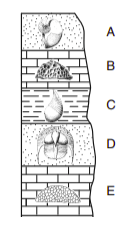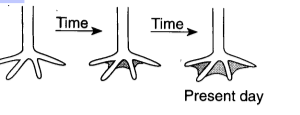The process in which a species has changed over time is known as this.
What is evolution?
He is known as the Father of Evolution
Darwin
The ability of an individual to survive and reproduce is known as this.
What is fitness?
Who is known as the Father of Evolution?
Charles Darwin
A mistake in the genetic code of a section of DNA is known as a ______________.
mutation
Similar structures that evolved from a common ancestor such as bones humans, cats, bats, and whales have in common.
Homologous Structures
Which adaptation protected the dark-colored moths from predators?
(1) breeding (3) migration
(2) camouflage (4) hibernation
(2) camouflage
Any inherited trait that increases an organism's chance of survival is known as this.
What is an adaptation?
Darwin was from the 1800's. What part of modern science did he lack knowledge of in order to better explain how traits were passed down from parent to offspring?
genetics and DNA
This type of symbiotic relationship results when both species benefit
What is mutualism?
Preserved remains of ancient organisms
What are fossils?
This term refers to different traits and alleles within a population.
What is variation?
The concept that organisms who are the best suited to their environment will be the most successful
What is survival of the fittest?
This is a type of structure that was once used in a species, but has since evolved to be of no real use.
vestigial structure
Variations in traits, such as the fur color of rabbits, may be caused by
Sexual Reproduction

common ancestors
The concept of humans selecting desired traits in species.
What is Articial Selection?
Structures with similar functions but are not similar in origin. These are not proof of a common ancestor but proof that evolution can occur
Analogous Structures
Rock layers that have not been overturned are exposed in a cliff. The rock layers contain many fossils. In which rock layer do the fossils most closely resemble existing species?

A
What are the 5 evidences of evolution?
Structures, DNA, Fossils, Embryos, and geography
The concept that members of each species are seeking the same food, space, and other necessities is known as this.
What is competition?
Organisms that have same structure but different function are known as
(1) analogous structure
(2) homologous structure
(3) vestigial structure
(4) adaptations
1 Analogous Structure
Which rock layer is oldest?

E
What do these homologous structures indicate about these organisms?:max_bytes(150000):strip_icc()/about-homologous-structures-1224763_sketch_FINAL2-4c326d5ec6a5440d9224580a5bbe36d7.png)
They have a common ancestor.
What caused the change in color of the peppered moth?
(1) renewable resources
(3) nonrenewable resources
(2) solar energy
(4) geothermal energy
(3) nonrenewable resources
Which term refers to the process by which individuals that are better suited to the environment survive and reproduce therefore passing down their genes to their offspring?
Natural Selection
This type of symbiotic relationship results when one species benefits and the other is neither helped not harmed
Which adaptation protected the dark-colored moths from predators?
camouflage
According to Darwin, individuals that grow to be adults
(1) transmit characteristics that they acquired to their offspring.
(2) tend to produce fewer offspring than those that do not survive.
(3) are the ones best adapted to live in their environment.
(4) will bring about unfavorable changes in the species.
(3) are the ones best adapted to live in their environment.
The bones of this ocean animal have been examined and proven that their ancestors at one time walked on land. They are distantly related to the hippopotamus.
What is a whale?
The changes in foot structure in a bird population over many generations are shown in the diagram below.

(1) extinction (3) use and disuse
(2) evolution (4) stable gene frequencies
(2) evolution